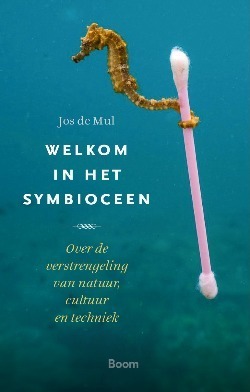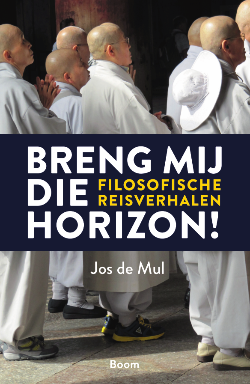Geert Maarse. Panic in the Polder. Interview with Jos de Mul. Erasmus Today, March 28, 2017.
Panic in the Polder or how the Netherlands can survive populism. Days before the Dutch elections professor Jos de Mul spoke on Erasmus Studio, presenting his book ‘Paniek in de polder’ (Panic in the Polder) in which he analyses the so called fight between ‘the people’ and ‘the elites’. He also explains the popularity of Donald Trump and Geert Wilders among populist voters. The question is: who are these populists? And is our democracy in crisis?
For several years many authors and politicians have been talking about a crisis of democracy. Signs of political disenchantment, indifference to political affairs as well as new forms of protest by outraged citizens are considered to be indicators of a crisis. However, the intensity of the current debates reveals that democracy is blooming. The history of democracy is also a history if its crises, says philosopher Jos de Mul. He is Professor Philosophical Anthropology at Erasmus University Rotterdam.
“After 9-11 and the murder of Pim Portuyn, people panicked. Until then we had this ‘Polder Model’ in the Netherlands where all parties tried to find middle ground. It brought together employers and employees, people from different religious and political backgrounds and it worked. After Pim Fortuyn was killed public opinion changed. For a while it seemed as if a civil war had just begun. While in reality it wasn’t so bad.”
It marked a change in the political field. Although according to De Mul that change can be traced back to the end of the Eighties, after the fall of the Berlin Wall. “In 1995, our Prime Minister at the time spoke of shedding of our ideological feathers. It was a time of neoliberalism that many political parties embraced. It didn’t matter what centre party you would vote for as they would all had the same policy with regard to the economy. It started an era of privatization and outsourcing of gouvernmental tasks and resulted in a depolitisation of politics. That’s when people started to move to the extremes. Far left and far right won popularity. They expressed the needs of a group of people that felt they were victims of neoliberalism. It marked the rise of the populism.”
Demagogy is just as old as democracy itself, according to De Mul. But what exactly is populism?
“Populism can be connected with various ideologies. It is often associated with right-wing ideologies, like the Front National of Marine Le Pen in France, but you also find it on the left side. Like Chavez in Venezuela was a populist. It can even be connected to confessional ideologies. Like the Christian populism we see in Hungary and Poland and Erdoğan’s islamitic ideology in Turkey.”
What makes Geert Wilders a populist?
“You could say that despite all the differences all populists share a very specific idea of democracy. Populists are democrats. Like all democrats, they find that the people should be represented in government. That is the premise of democracy. There's nothing wrong with that. But what distinguishes populists is that they have a very specific conception of this representation. They assume that the people are one. That takes us back to Jean Jacques Rousseau who wrote a few centuries ago that democracy should reflect the volonté Générale, the general will of the people. But even Rousseau wasn’t sure what exactly this will of the people was. It is not the majority, it is not the voice of all, it is more of a mystical thing, according to Rousseau. And populists always rely on the will of the people.
What is wrong with that?
“The point is that most democrats are pluralists, they assume that they should represent different groups and different individuals with their own ideas and interests. A populist assumes that there is one specific popular will and a distinguished culture that they represent. If people disagree, populists have an answer to that. They will say you do not belong to ‘the people’.”
Can De Mul give an example?
“Yes, think of foreigners and refugees in our society. In that respect, there is a strong nationalistic aspect in many populists. But if your nationality does not exclude you and you still disagree with the populist, you can be dismissed as hostile. Like the elite. They are the intellectual, journalists, the media, bankers. Who they are exactly depends on the circumstances. In Turkey, for example, they will be the Gülenists.”
Is that a clever trick of the populists to turn anyone away?
“It is also a very old trick. We find it in ancient Athens too. Democracy was still very young and when war broke out between Athens, which was a democratic city-state, and Sparta, the democrats from Athens were turned upon as being dissidents. They were replaced by authoritarian leaders immediately.”
One of the features of the populist, De Mul wrote in his book is the use of the media. What’s the role of Twitter in this?
“Like Trump, Wilders uses Twitter a lot. Those 140 characters are not suitable for extensive arguments, but they are very suitable to pose strong, over-simplified opinions and gut feelings and emotions. And there is no critical filter. In newspapers there is always some sort of fact checking. Tweets don’t have that. Wilders has 750,000 followers on Twitter. That's more than the newspapers Volkskrant and NRC have together. That’s a huge influence. Finally, tweetocracy rests on so-called filter bubbles in which people only get information that reinforces their already existing beliefs.
Representative democracy is under strong criticism. Modernisation, according tot the critics, is needed. What’s De Mul’s opinion?
“As soon as the populists are going to power they bring their policy of exclusion in practice.
You see that happening in Turkey, in Hungary, in Poland for example. They will actually discriminate against certain groups. Trump and Wilders talked about fake and ‘so-called’ judges. The next step would be to fire these judges or put them in jail. That would be a nightmare. In the Netherlands, we fortunately have a system where coalitions must be formed. But in the United States, that now has a populist in power, you see a ‘the-winner-takes-all’ situation. Fortunately, the press and the judges still strongly resist Trump’s populist policies.
A representative democracy like ours seems to guarantee the involvement of the highest possible number of citizens and thus equal opportunities to influence the political process. Representative democracy is the best system we have so far. If you ask people in the Netherlands they are sometimes highly dissatisfied by our politicians because they feel unrepresented. But they speak highly of the political system. Our democracy and constitutionality is highly valued. Both by other countries as well as by people in the Netherlands.”
Text: Manon Sikkel Daelmans









